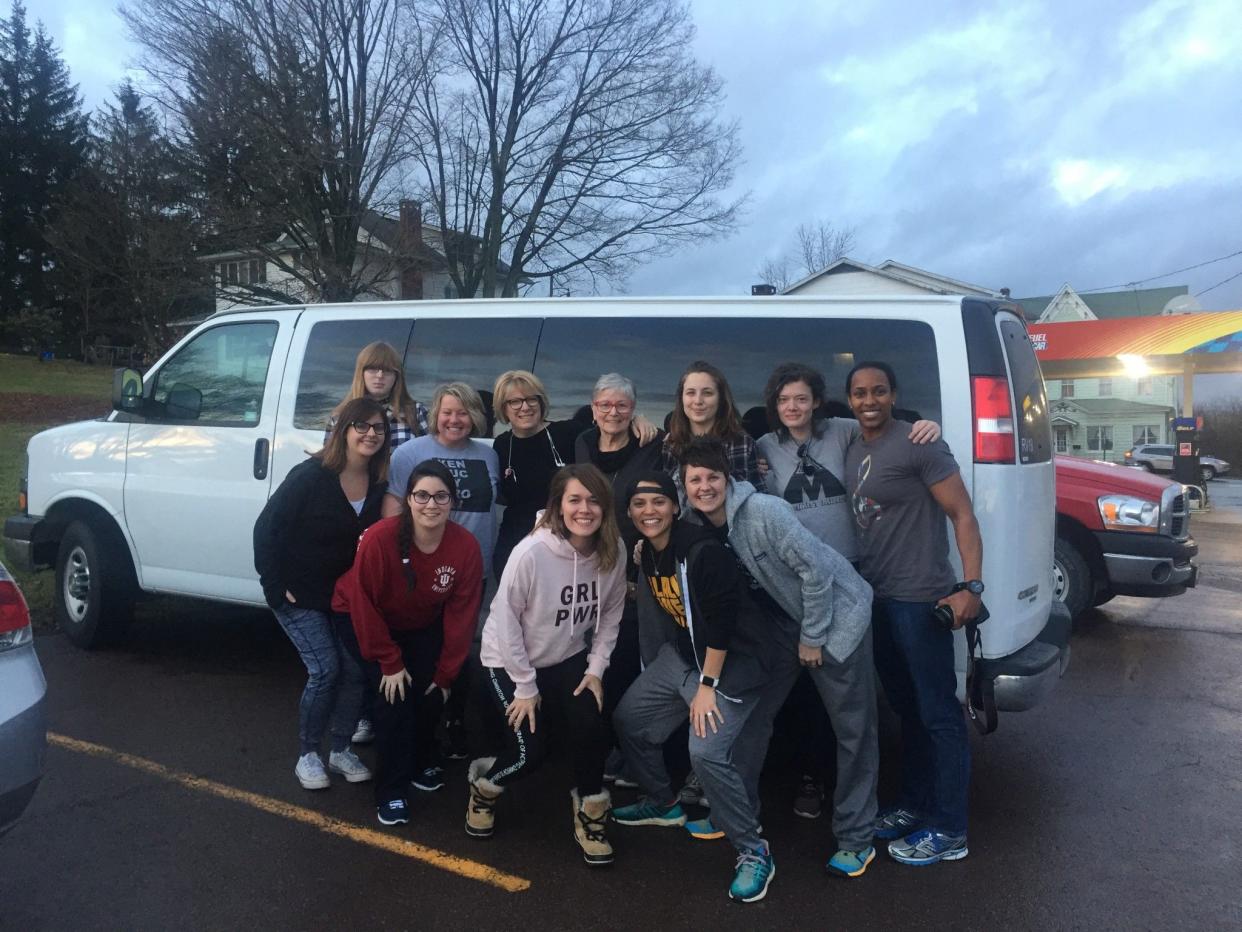The 'Sisterhood of the Van,' one year after the Women's March

Jocelyn Duke treats her memory of that day as a talisman, taking it out when the actual moment feels distant, turning it this way and that in her mind.
“I sit and reflect that I was there, I was part of that,” says Duke, an artist and teaching assistant in Louisville, Ky. “I remind myself how it felt to be part of something that will go down in history as pivotal and powerful.”
Meg Hancock does the same, summoning images of the seemingly endless crowd to push back against bouts of despair in the months since then.
“2017 was an absolutely exhausting year,” says Hancock, a University of Louisville assistant professor of sports administration. “The energy from the march carried me through, made me keep going when I might otherwise have been wrung out.”

This weekend will mark the first anniversary of the Women’s March on Washington — an event that included more than just women and happened in more than just Washington. An estimated 3 million people attended events on every continent of the globe, perhaps the largest single-day protest gathering in history.
The year that followed was a big one for women’s issues: the #MeToo movement, the fight over health insurance and reproductive rights, the surge in female candidates for all levels of office. The year was also a big one for protests — against racism, against climate change denial, against police brutality, in support of immigrants, in support of white power.
But the first of those, the largest and, in many ways, the spark for the rest, was the Women’s March. And on its anniversary one group of 10 women from Louisville, who rented a van and drove 12 hours to the nation’s capital, are looking back on how that journey did and did not change them in the year that followed.

“It was life-altering,” says Julie Peyton, a visiting nurse. “My year didn’t start on Jan. 1, 2017, it started the weekend of Jan. 20-21. It’s been a crazy freaking year.”
Duke says that attending the march influenced her artwork. She spent the year creating T-shirts with such messages as “Shhhhh, your privilege is showing,” “Just because a problem isn’t yours, doesn’t mean it’s not a problem” and “Stop clinging to stereotypes that have been passed down to you.” It also led her to take a full-time job as a teaching assistant at a Louisville middle school.
“I have felt an increasing sense of urgency to be a role model this year, particularly for young women of color,” she says of what she describes as her “calling” to the position. “I am only the second black teacher in the building. They just want to see someone who looks like them.”
Others from what they’ve nicknamed the Sisterhood of the Van have also reevaluated their life’s work this year. Hancock and Bridget Pitcock, who have been married for four years, together applied for the Emerge America Program, which trains Democratic women to run for office. But they both eventually decided that the timing is not right and they can better advance progressive causes in other ways.

For Pitcock that means going back to school for her master’s degree in nursing so she can transition from a managed-care case manager to a hands-on nurse practitioner. “It’s the best way I can think of to address the health disparities within the LGBT community,” she says, “since many of those stem from patients not feeling safe with practitioners.”
For Hancock, it means seeing her classroom as a place to introduce a wide swath of ideas to “the 18- to 22-year-olds who might not otherwise encounter them,” she says. “It’s my responsibility as an educator to get them to think more critically about their place in society — not necessarily to tell them what that is, but to help them figure it out for themselves.”
Peyton, in turn, didn’t change the work she does, but she did upend the place she does it. Nine days after the march, she moved — temporarily, she thought — for a months-long nursing position in Seattle. When that contract was up, she signed a longer-term one because she found she relished the “freedom” of living in a “blue state” surrounded by more people who share her political views.
“It’s a stifling feeling being in Louisville compared to being out here,” she says. “I love Kentucky, I love my state, but I hesitate to go back to feeling stifled.” Language she learned at the march is a regular part of conversation in her new hometown, she says: “Words like ‘marginalized,’ ‘intersectionality’…”
And Linda Wilhelms says the ways she has changed since the march don’t involve any external changes, but rather “profound internal ones.” No stranger to protests — now 71, she began with those against the Vietnam War — she says that the one last January “empowered me in ways I’d never experienced before.”

“I thought I had been speaking up my whole life, but now I see that maybe I haven’t,” she says. By way of example, she describes a trip to her local Dollar Store where she heard the manager confront a 10-year-old African-American boy who was there shopping with his grandmother, telling the child, “I’ve got my eyes on you.” Outraged — and thinking particularly of the young African-American teen in the “We Are With You” T-shirt whom she met at the march — she pushed back. “You wouldn’t say that to my grandson,” she told the manager, leaving the store without buying anything.
Her 20-year-old granddaughter, Blair Wilson, feels similarly transformed. While her “Nana” is a protest veteran, Wilson, a nursing student, was a first-timer last January and was nervous at the start. She says she’s not nervous anymore.
“Before the march, I had always been a very quiet and shy person,” she says. “I didn’t like making a scene or making a big deal out of things. But standing in the middle of that crowd, I realized that if I wanted to make a difference I couldn’t hide in my safe neighborhood, in my safe life. I had to go where the problems were. I had to get over my own insecurities and speak up.”
In the past year she has done so, offering rides to clients of the Social Security office, paying for a family’s groceries when their public assistance was not enough to cover their total at checkout, and holding supportive signs outside the only clinic in Kentucky where abortions are still available.

Nearly all the women from the van say they have marched, often, since the Women’s March. “I’ve done more marches in the past year than I have in the past decade,” Wilhelm says. She and Wilson have marched for reproductive rights and against ending the Affordable Care Act, better known as Obamacare. Kaitlin U’Sellis, a health care analyst, marched in support of refugees and immigrants, and visited the office of Senate Majority Leader Mitch McConnell, R-Ky., to express her support for Obamacare.
Pitcock and Hancock, who have long been regulars on the LGBT protest circuit, expanded their list of causes and attended marches in support of Black Lives Matter, immigrant rights and the removal of Confederate statues. Pitcock helped organize a fundraiser for the ACLU that raised $3,450. And although Wilson says she has found a new voice, Pitcock and Hancock say their lesson from the march was to use theirs less. “One of the speakers in Washington said something like, ‘You don’t need to be a voice for the voiceless, people aren’t voiceless — you just need to pass the mic.’ So that’s our takeaway, to show up and support others, and then let them speak.”
Though all the women are certain that the Women’s March changed them, they are not as sure that it changed the country.
“I think it definitely had an effect,” says Maddie Dalton, now a college freshman, who was invited along on the van ride by women who knew her by reputation — a transgender teen, she forced the bathroom question in Louisville’s public schools and won. “But I’m not sure its momentum carried on as much as we had hoped.”

On the one hand there were ripple effects, with more women running for office, more women speaking out against sexual harassment and assault, and the derailment of much of the new administration’s agenda. On the other hand, Pitcock says, “I also feel there was major blowback from the other side. The white supremacist movement got stronger and more vocal. I think a lot of people on that side saw all these women come together and hated it.”
So will they be marching again this weekend, at one of the hundreds of anniversary events, of varying sizes, scheduled to take place around the country and the world?
Dalton will not. “I’m gonna have a ton of homework,” she says, adding that “as a leftist I think the only answer is violent revolution, which most of these marches don’t support.” Duke will not march either, because a trip to Lexington, the closest official march site, is not in her teaching assistant/struggling artist budget.
But Pitcock and Hancock will be there, possibly renting another van for the trip. Wilson and Wilhelms will be there, too, carrying the same signs they brought to Washington last year, ones that read “Respect our existence or expect resistance” and “Kentucky women stronger together.” Peyton will march in Seattle, attending with new “vegan friends, because that’s Seattle” and wearing the pink “pussy hat” someone handed her in D.C.

U’Sellis hopes to find an event closer to home in Louisville, one she can attend with her 4-month-old son, whose story is already entwined with the cause. U’Sellis miscarried twins in 2016, and Jan. 20, 2017, would have been their due date. Instead she spent that day in a van, keeping to herself the news that she had just taken a positive pregnancy test.
Thomas was born in September, and his mother wants to bring him to what will effectively be his second Women’s March. “I’m behind on his baby book, but I want to make him one to make sure he knows he got to go to Washington,” she says. “He was there. I want to make sure he knows that.”
_____
Read more from Yahoo News:


